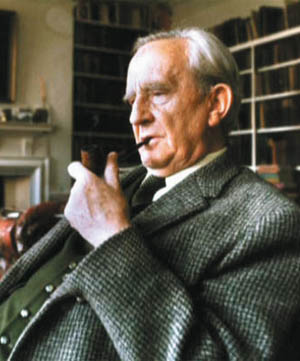
Éomer comments on Saruman's words: "So would the trapped wolf speak to the hounds, if he could." Thus also would many a dictator and invader speak to his victims: "If you go to war, needlessly, for I did not desire it " No doubt he did not desire it! Clearly Saruman's preference, as the preference of Hitler, of Wilhelm, of Napoleon, of King George III, would have been for Théoden to have sat in Meduseld ignoring his enemy's encroachment until it was too late and Saruman would have gained dominion over the lands of Rohan and undoubtedly would have tried to spread his influence to Gondor.

What stands out like a beacon from this passage is Tolkien's rejection of the "peace at any price" dogma. Thus Saruman and Théoden after the battle of Helm's Deep. "Yes, we will have peace," he said, now in a clear voice, "we will have peace, when you and all your works have perished-and the works of your dark master to whom you would deliver us." "We will have peace," said Théoden at last thickly and with an effort. I say, Théoden King: shall we have peace and friendship, you and I? It is ours to command." "If you go to war, needlessly, for I did not desire it, then men will be slain. a perceived wrongness of the method of fighting it-and a deep natural melancholy that colored all of Tolkien's opinions, and a picture begins to emerge of a cautious moderate, a man who believed in justice and freedom but knew firsthand the costs, sometimes, of obtaining them. So what are these conflicts of Tolkien's? Most obvious is the quandary of many if not most reasonable people: the desire for peace and safety against the defense of "life, liberty, and the pursuit of happiness." Add to that a belief in the justice of one's position against a hatred of the atomic bomb ("fighting Sauron with the Ring") and of air battles ("infernal combustion engines")-essentially a severe concern for the rightness of the battle vs. Certainly his seemingly several views of war and peace were rooted in his experiences in the war as well as his intellectual judgments of the world around him.

Tolkien himself knew that his writing sprang from the wells of his experiences as well as his imagination, and talked often of the great tree, whose roots were founded down in the dark mould of experiences taken in, composted, and allowed to sift together and recombine until not even he knew what might next rise to the top. Though Carpenter has well recounted Tolkien's dislike of the school of literary "criticism" that proposed to plumb the depths of an author's works by examining that author's biography, the reverse, the process of shedding light on an author's life experiences by looking for the meaning in his writings, has a certain value that cannot be discounted. We see this conflict played out in many forms, both in his letters to his children serving in World War II, in the comments of his biographer Humphrey Carpenter, and, of great interest to us, in the characters of The Lord of the Rings. Is it any wonder that Tolkien should have emerged from his war experiences, after the deaths of two of his three closest friends, somewhat in conflict about the nature and justice of war? With the utmost deference to our modern armed forces and respect for the missions they carry out, I submit however that far fewer of the world's fighting men today are called upon to witness scenes of horror such as those that presented themselves in the older style of warfare. Tolkien, a man of imaginative vision, depth of soul, and sensitivity of feeling, watched his comrades blown literally into pieces, saw the filth of trench life, and felt firsthand the bitter irony of the killing of his fellow men with whom he had no personal quarrel, men who, like himself, were following the orders of their government. Death not at the end of a missile trajectory, but at arm's length close acquaintance not with computerized weapons technology but with the bayonet deployment not to a peacekeeping force or to patrol duty, but to the front lines of defense against a determined invader with designs of conquest. The trenches of 1916 were a hard place to learn war.

War and Peace: The Many Faces of Tolkien or are they?

| Anwyn's Counterpoint | War and Peace: The Many Faces of Tolkien - or are they?


 0 kommentar(er)
0 kommentar(er)
